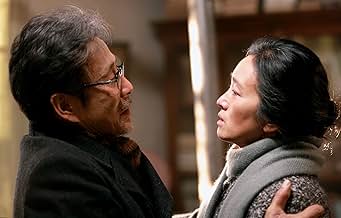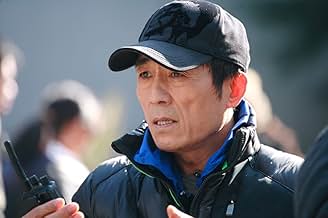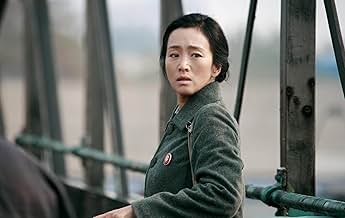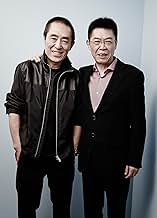Lu y Feng forman una pareja devota, forzada a la separación cuando Lu es detenido y llevado a un campo de trabajo para prisioneros políticos durante la Revolución Cultural. Cuando regresa a ... Leer todoLu y Feng forman una pareja devota, forzada a la separación cuando Lu es detenido y llevado a un campo de trabajo para prisioneros políticos durante la Revolución Cultural. Cuando regresa a casa, su amada no le reconoce.Lu y Feng forman una pareja devota, forzada a la separación cuando Lu es detenido y llevado a un campo de trabajo para prisioneros políticos durante la Revolución Cultural. Cuando regresa a casa, su amada no le reconoce.
- Dirección
- Guionistas
- Elenco
- Premios
- 23 premios ganados y 49 nominaciones en total
- Dirección
- Guionistas
- Todo el elenco y el equipo
- Producción, taquilla y más en IMDbPro
Opiniones destacadas
Coming Home is a great example of the way in which a movie can move you, play on your emotions, without being sentimental in a negative sense. Without being a tear-jerker. And without harsh images of struggle and war. But with excellent acting, small gestures and not so much words. This movie is all about empathy, first among the characters in the story depicted, but by consequence also among the audience, that is swept away and taken in by the sentiment.
This doesn't mean that the story is only about love and compassion. The Cultural Revolution in China (1966-1976) was far from being peaceful and compassionate. People were separated for years without any information, were forced to report any 'wrong' behavior that could 'harm' or 'threaten' the Communist Party. Coming Home shows how such an environment affects people at the individual, family level. People get damaged and family relations are shattered because of betrayal.
Coming Home succeeds in portraying the consequences of such a regime, by showing what humanity and compassion mean. And that is what makes it special, and refreshing in a world where it sometimes feels like these values are hard to find.
This doesn't mean that the story is only about love and compassion. The Cultural Revolution in China (1966-1976) was far from being peaceful and compassionate. People were separated for years without any information, were forced to report any 'wrong' behavior that could 'harm' or 'threaten' the Communist Party. Coming Home shows how such an environment affects people at the individual, family level. People get damaged and family relations are shattered because of betrayal.
Coming Home succeeds in portraying the consequences of such a regime, by showing what humanity and compassion mean. And that is what makes it special, and refreshing in a world where it sometimes feels like these values are hard to find.
"Coming Home" (2014 release from China; 110 min.) brings the story of Lu, a "rightist bastard" during the Cultural Revolution. As the movie opens, we see a woman (Feng) and her daughter (Dandan) being called into the Propaganda Office of the girl's school, where they learn that Lu (the husband and father, respectively) has escaped from labor camp, and that they are not to see him. Feng and Lu nevertheless decide to meet up at the train station, where Lu gets captured again. We are then told "Three years later, the Cultural Revolution ends", and Lu arrives back home. Much to his shock, Feng does not recognize him. What caused Feng's amnesia? Will she ultimately recognize him? To tell you more would spoil your viewing experience, you'll just have to see for yourself how it all plays out.
Couple of comments: this is the latest movie from director Zhang Yimou (best known here for "House of the Flying Daggers"), Here he tackles a potentially sensitive topic in China, namely the horrible Cultural Revolution. But don't think that this is a political movie. Instead, it is a love story that happens to be set during and after the Cultural Revolution. Feng is played by the leading Chinese actress Gong Li (think of her as the Meryl Streep of China), and plays the role with restraint and visible hurt. Special mention also for the beautiful Zhang Huiwen in the role of Dandan (check out the ballet performances!). Last but not least, I couldn't help but notice that the piano you hear in the orchestral score is played by none other than Lang Lang. Bottom line: "Coming Home" is a slow-moving (in the best possible way) movie that examines the long shadows of the Cultural Revolution through the eyes of one particular couple.
This movie is now a year and a half, yet it recently showed up out of the blue at my local art-house theater here in Cincinnati. Better late than never I suppose. The weekday evening screening where I saw this at was attended poorly. A shame. If you are in the mood for a top-notch quality foreign movie that is light years away from your standard Hollywood fare, you may want to give this a try. "Coming Home" is HIGHLY RECOMMENDED!
Couple of comments: this is the latest movie from director Zhang Yimou (best known here for "House of the Flying Daggers"), Here he tackles a potentially sensitive topic in China, namely the horrible Cultural Revolution. But don't think that this is a political movie. Instead, it is a love story that happens to be set during and after the Cultural Revolution. Feng is played by the leading Chinese actress Gong Li (think of her as the Meryl Streep of China), and plays the role with restraint and visible hurt. Special mention also for the beautiful Zhang Huiwen in the role of Dandan (check out the ballet performances!). Last but not least, I couldn't help but notice that the piano you hear in the orchestral score is played by none other than Lang Lang. Bottom line: "Coming Home" is a slow-moving (in the best possible way) movie that examines the long shadows of the Cultural Revolution through the eyes of one particular couple.
This movie is now a year and a half, yet it recently showed up out of the blue at my local art-house theater here in Cincinnati. Better late than never I suppose. The weekday evening screening where I saw this at was attended poorly. A shame. If you are in the mood for a top-notch quality foreign movie that is light years away from your standard Hollywood fare, you may want to give this a try. "Coming Home" is HIGHLY RECOMMENDED!
Zhang yimou done it again. And Gong Li is more than ever - one of her best roles...i'm always hoping that she does more movies. And when Yimou and Gong Li work together it always comes an amazing movie. I wish they could go on professionaly together."Coming Home": It is a simple story, yet with powerful meanings. Everything is beautiful: the performances, the direction, the photography, the music... And that piano scene... Achingly. Every yimou's movies has such sensibility. He really knows how to touch.
Thank you Gong Li and Zhang Yimou.
An applause too for the male actor and the girl who played the daughter - hope she will get a great career.
Thank you Gong Li and Zhang Yimou.
An applause too for the male actor and the girl who played the daughter - hope she will get a great career.
I'm was born in early 90s in China. As I grow up, my parents always consciously saving up everything. They do not waste anything, food, clothes, etc..
My mom is good at stitching clothes. Even thou she can afford buying a new pair of socks, she chose to stitch up the worn ones. I thought I'd never understand why my parents are so thrifty, until I watched this movie.
I came to realize what a hard, tough and poor life my parents had went thru after watching this movie. I was even surprised that my parents could actually survived that period of time.
I realized that people don't need that much of things to survive. When my friend and I shopping in mall, talking about cosmetics and luxury bags, and living a wealthy and "fancy" life, while my mother when she was in my age, struggling to live, wearing the same clothes everyday, celebrating her birthday by only eating an egg, running after trains in order to pick up the "coal ball" (trains in old time use coal as the fuel and the coal ball is the coal which was not fully burned, and could still being used for generating a little heat).
This is a great movie to honor that harsh period of time in China's history. And I'm also glad to see that Chinese government now allows people to talk about that period of time and even make a movie about it.
My mom is good at stitching clothes. Even thou she can afford buying a new pair of socks, she chose to stitch up the worn ones. I thought I'd never understand why my parents are so thrifty, until I watched this movie.
I came to realize what a hard, tough and poor life my parents had went thru after watching this movie. I was even surprised that my parents could actually survived that period of time.
I realized that people don't need that much of things to survive. When my friend and I shopping in mall, talking about cosmetics and luxury bags, and living a wealthy and "fancy" life, while my mother when she was in my age, struggling to live, wearing the same clothes everyday, celebrating her birthday by only eating an egg, running after trains in order to pick up the "coal ball" (trains in old time use coal as the fuel and the coal ball is the coal which was not fully burned, and could still being used for generating a little heat).
This is a great movie to honor that harsh period of time in China's history. And I'm also glad to see that Chinese government now allows people to talk about that period of time and even make a movie about it.
Some of the dialog at the very beginning not quite correct and right during the Chinese Culture Revolution. The Chinese people in that darkest ten years torment, many jargon would not be said like what we heard in this movie. If the protagonist is a "Spy" as his daughter called him, he would already have been shot instead of banished to a far away poor farm as a labor. Such labors at that time were tagged as "Anti-Revolutionist" , "The Left Extremist", "Stinking Old Nine" or "The 5th Black Category Member". There were many carelessly written labeling names or words that didn't comply with that atrocious era. I was just amazed how the billion Chinese would let go of such torturous and treacherous when the Culture Revolution lost its goal and suddenly ended after 10 years living hell. Most Chinese are not like the Jewish people who had suffered so much that they would never let it go and so easily forget what their ancestors suffered. But the Chinese people are such weird species with extremely short memory. When every absurd but cruel movement ended, what they had experienced was just like the old Western saying: "Water under The Bridge", they just took it for granted and awaiting the next movement coming up to torture them. This is also explained why the CCP regime still exists so far, and again, the Chinese people are suffering the prison-like deadly control during a lightweight Omicron virus crisis. They are whining, crying and complaining, but I guess when the CCP decides to end the siege, they would immediately forget what they once suffered, just like what their parents and grandparents had suffered during the Cultural Revolution. Living under the iron fist of the CCP, Short Memory, Letting Go and Moving On maybe are all must-have for the 1.4 billion Chinese subjects?
¿Sabías que…?
- TriviaGui lai (2014) had its international premiere at the 2014 Cannes Film Festival in the out of competition section. It was scheduled to be screened in the Special Presentations section of the 2014 Toronto International Film Festival.
- ConexionesFeatured in Sven Uslings Bio: Bästa filmer 2020 Del 1: Plats 20-11 (2021)
- Bandas sonorasSong of the Fishermen
Written by Ren Guang
Arranged by Quigang Chen
Selecciones populares
Inicia sesión para calificar y agrega a la lista de videos para obtener recomendaciones personalizadas
- How long is Coming Home?Con tecnología de Alexa
Detalles
Taquilla
- Total en EE. UU. y Canadá
- USD 377,607
- Fin de semana de estreno en EE. UU. y Canadá
- USD 26,361
- 13 sep 2015
- Total a nivel mundial
- USD 47,587,984
- Tiempo de ejecución
- 1h 49min(109 min)
- Color
- Mezcla de sonido
- Relación de aspecto
- 2.35 : 1
Contribuir a esta página
Sugiere una edición o agrega el contenido que falta






































